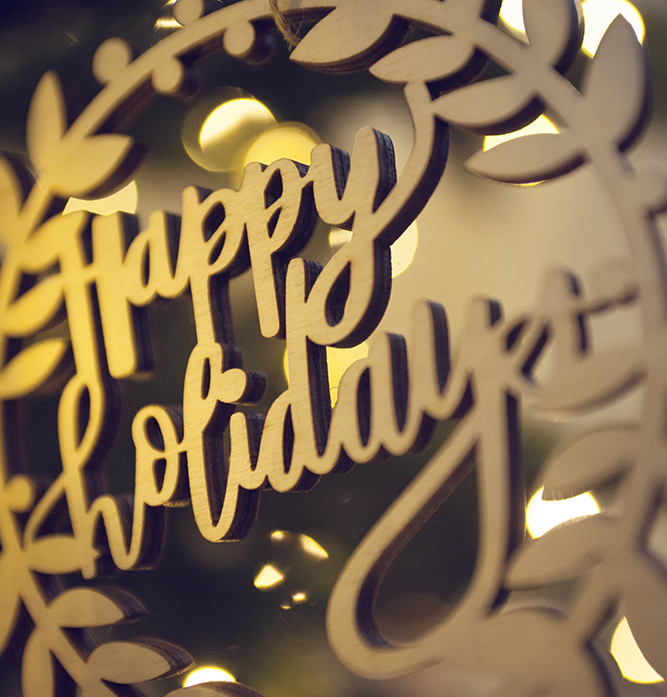An Examination of the Holidays Celebrated (and Not Celebrated) at the Mount
By Desiree Leader | Observer Contributor

The holiday season is happening all over the world. Eighty-five percent of people in the United States will be celebrating Christmas–everywhere you look, there are lights, trees, and Santas. As a matter of fact, in America, Christmas is celebrated 14 times more often than Hanukkah, and the ratio of people celebrating Kwanzaa to Christmas is 1:49. Although Christmas is the most popular holiday in America, it is clearly not the only one. Despite the Mount taking steps to be inclusive, some people feel that more could be done.
Amal Elkhoury, a Professional Writing major, does not celebrate any holidays due to her religion. As a Jehovah’s Witness, Elkhoury said that while she is used to the holidays being celebrated around her, she feels that sometimes there is “some judgment” by people when she doesn’t celebrate them herself. Sometimes people force holidays upon her by giving her gifts against her wishes, even after specifically being asked not to. “Sometimes it does make me feel hurt,” admitted Elkhoury.
Some people on campus celebrate more than one religious holiday in the winter. Khygann Hobbs, another Professional Writing student, looks forward to both Hanukkah and Christmas. Hobbs enjoys Christmas for the togetherness and family, and Hanukkah for the celebration of a miracle. Hobbs says that one of her family’s traditions is to open a present on Christmas Eve – usually pajamas. Food is also a big part of the holidays for Hobbs. “On Christmas, we open presents and cook a big meal,” she explained. For Hanukkah, she has latkes (potato pancakes) with red hots used to flavor the homemade applesauce she puts on top of them. She has recently disregarded her family’s tradition of a natural tree and has bought herself a fake one for her apartment.
Some students recognize that their faiths and traditions do not receive as much institutional recognition in the form of holidays and familiarity as others, and not all of the holidays celebrated by Mount Wachusett Community College students occur in the Winter. Eid, a Muslim holiday, is celebrated in the spring or the summer and occurs twice a year. The first one happens after Ramadan, a time of fasting from food and also from “habits you want to get rid of,” stated an anonymous student. She continued by explaining that it is “such a beautiful time…of community and being together.” She noted that we have breaks during Christmas, but not during Ramadan, which can be difficult because of the fasting involved. Taking tests can be challenging after not eating. With her birthday the day after Christmas, that day was a good time for her family to go out and celebrate together.
As with most holidays, Eid also has its food traditions; at the second Eid, a goat or cow is roasted, a symbol of the sacrifice that Abraham attempted in his son, Isaac. It is a sign of willingness. Whatever is left over after the family eats is donated or shared.
Justina Johnson, a work-study student in the Student Life department, says that there is a lot going on for the winter holidays at the college. For Thanksgiving, they just finished distributing food baskets to students in need. MWCC’s annual Winterfest was on December 5th through the 7th, and Johnson stated it was,. “…a huge thing.” The Student Life department held a wreath raffle, and Johnson explained that the money goes toward paying for books through the Student Relief Fund.
Johnson emphasized that the Mount doesn’t “actually celebrate any specific holidays. We try to be inclusive.” That is why it is called ‘Winterfest.’
Another thing that MWCC does to celebrate this diversity is hosting an event through the Brewer Center. ‘Celebrations Around the World,’ speaks to the history and differences in celebrations. This event took place on December 13.
“It is acknowledging and…teaching about the holiday celebrations around the world.” Mina Girouard, a work study student in the Brewer Center explained. She pointed out that saying ‘Merry Christmas’ can be exclusionary to people with other beliefs and holidays. Girouard also said that the holidays have changed for some families and younger generations over the years, often not having the same religious meaning and being more focused on family and tradition.
Shelley Nicholson, the Director of the Brewer Center explained that they “did this event last year and it was very well received, so we’re doing it again.” Nicholson described the format as including food, hanging around, and having a “powerful presentation on the history” of some of the celebrations by a non-denominational (no specific religious denomination) minister, Reverend Sue. After the presentation, participants engage in a conversation discussing and celebrating their diverse traditions.
The more we understand, the better we can celebrate our differences with love and respect.
Comments are closed.